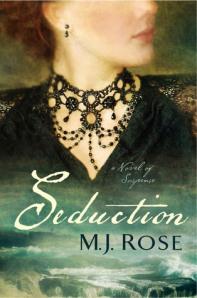
What’s it all about?:
From the author of The Book of Lost Fragrances comes a haunting novel about a grieving woman who discovers the lost journal of novelist Victor Hugo, awakening a mystery that spans centuries.
In 1843, novelist Victor Hugo’s beloved nineteen-year-old daughter drowned. Ten years later, Hugo began participating in hundreds of séances to re-establish contact with her. In the process, he claimed to have communed with the likes of Plato, Galileo, Shakespeare, Dante, Jesus—and even the Devil himself. Hugo’s transcriptions of these conversations have all been published. Or so it was believed.
Recovering from her own losses, mythologist Jac L’Etoile arrives on the Isle of Jersey—where Hugo conducted the séances—hoping to uncover a secret about the island’s Celtic roots. But the man who’s invited her there, a troubled soul named Theo Gaspard, has hopes she’ll help him discover something quite different—Hugo’s lost conversations with someone called the Shadow of the Sepulcher.
What follows is an intricately plotted and atmospheric tale of suspense with a spellbinding ghost story at its heart, by one of America’s most gifted and imaginative novelists.
What did I think?:
I received a copy of this book from NetGalley and Atria Books so many thanks to them for the opportunity to try out my first M J Rose novel. It was an interesting read and not what I expected when I read the blurb, but that’s sometimes a good thing. Throughout the novel, there are two narratives and different time periods running alongside each other, the first being the story of Victor Hugo who is fictionalised in this account but is famed for his successful novels like Les Miserables and The Hunchback of Notre Dame. In 1843, he tragically lost his nineteen year old daughter, Leopoldine who drowned in the Seine when a boat overturned. Her husband was also killed in the accident trying to save her. In M J Rose’s novel, she describes the grief experienced by Hugo as he struggles to overcome her loss. Never able to recover from his mourning, he embarks on a series of seances to try and make contact with her, a process he records meticulously in journals. His obsession with contacting his beloved daughter soon begins to threaten the relationship he has with his wife and other children and his wife begs him to stop for the sake of their offspring. Perhaps Hugo has already taken it a bit far however, as he seems to have linked up with a other-worldly creature claiming to be the Devil himself but who Hugo calls The Shadow of the Sepulcher, who tempts him with bringing Leopoldine back to life albeit in the most grisly of circumstances.
Cut to the present day and we meet our other main character, Jac L’Etoile, a mythologist who is fascinated by old stories, legends and other mystical behavior but has herself experienced a loss in her life. She is invited to the Isle of Jersey, home of the Hugo seances by Theo Gaspard, an old friend whom she has known since she was a teenager when they both spent a short time in an institution. She hasn’t seen him since then, and although she is warned by a friend who is suspicious of Theo’s nature, she is desperate to grab an opportunity to study the celebrated Celtic mythology of the island. Theo himself has his own quest to undertake – to try and discover the journals of Victor Hugo that were written so long ago which will give him certain answers that he craves.
One of the things I most enjoyed about this novel was the dual narrative and the switching between time periods. It was an intriguing and mysterious tale that used the facts about Victor Hugo’s life to spin a story filled with suspense that at times, bordered on horror. The author writes a note at the end using a terrific quote:
“Pablo Picasso said “Art is the lie that tells the truth.” Whenever possible in this novel, I’ve told the truth in order to tell my lie.”
I love a novel that you can read and think: This was a real person, this actually happened. M J Rose explains that in the chunk of the book devoted to Victor Hugo, much of what was written was derived from facts. For example, his daughter dying, the manner of him discovering her death (in a newspaper!), his trips to the Isle of Jersey and the seances he conducted which were all based on letters and conversations transcribed from his own hand. It is also true that Hugo did speak with an entity he called The Shadow of the Sepulcher (along with your regular ghosts Napoleon, Dante, Shakespeare, Jesus…). Personally, I did prefer the Victor Hugo sections of the book, perhaps because it felt slightly more authentic but as a whole it’s a decent read with a sprinkle of ghostly activity to send shivers down the spine.
Would I recommend it?:
Probably!
Star rating (out of 5):


